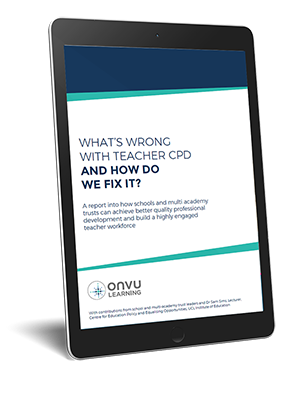- Self-Reflection
- 5 Minute Read



Teaching is a noble and ever-evolving profession, one that holds the power to shape minds and futures. Every educator, whether they work in high schools or primary schools, should understand the profound significance of self-reflection within their chosen vocation. It's not just a buzzword; it's the cornerstone of personal and professional growth.
Discover how self-reflection enhances professional development, classroom management, student-centered learning, teacher-student relationships, and more through reflective teaching strategies. It's not just a mirror to teaching techniques; it's a window to personal and professional growth. Explore these invaluable advantages, which extend beyond the classroom to shape both your effectiveness as an educator and the futures of the young minds you nurture.
This blog explores 8 benefits that build a case for effective self-reflection:
Effective classroom management is essential for a productive learning environment. Through regular self-reflection, teachers can identify both successes and areas for improvement. Using tools like classroom recordings or notes, they can pinpoint instances where student behaviour was well-managed or when a change in strategy is needed.
For example, if a group activity frequently goes off-track, the seating arrangement or instruction clarity might be the cause. Recognising patterns helps adjust tactics accordingly. Feedback from students can also offer valuable perspectives on effective management strategies.
These actionable insights help create a more orderly and conducive learning environment, benefiting both teachers and students.
In any endeavour, the core motivation for self-reflection remains consistent: the pursuit of improvement. The field of education is no exception to this principle.
Embracing self-reflection empowers teachers with invaluable insights, enabling them to proactively refine their teaching skills. This process extends to various facets of teaching, encompassing the enhancement of student engagement, the fostering of lesson clarity, and the overall improvement of classroom dynamics.
The ultimate objective is to enrich the learning experience and outcomes for students. By critically evaluating their instructional approaches, educators can identify their strengths and areas in need of improvement, subsequently formulating strategies to elevate their teaching proficiency, thus propelling their career forward throughout each stage.
Educational settings are transitioning from teacher-centred to student-centred learning environments. Adaptation and reflection on teaching methods to cater to students' needs are fundamental in prioritising their best interests.
Moreover, educators who actively engage in self-reflection can impart this valuable skill to their students. Encouraging students to become reflective learners equips them with a life skill that extends beyond the classroom.
“We’ve found giving our teachers the opportunity to frequently self-reflect on their teaching practice has helped observations take on a more practical application, as teachers can address issues in the here and now. We also felt switching the focus away from teaching practice and orientating it towards pupil learning behaviours instead could positively impact on pupil outcomes.”
David Chapman
Head of School, Aston University Engineering Academy
In this article featured in The Educator, David Chapman explores: A more learner centred approach to classroom observations
Building strong relationships with students is fundamental for creating a positive and productive learning atmosphere. Self-reflection provides teachers with the means to assess their interactions with students, enabling them to delve into the nuances of these relationships.  By closely examining their teaching methods and communication styles, educators can uncover valuable opportunities to foster more meaningful connections with each individual student.
By closely examining their teaching methods and communication styles, educators can uncover valuable opportunities to foster more meaningful connections with each individual student.
This recognition of what resonates with students and the subsequent adaptation of teaching approaches can result in a substantial improvement in rapport and significantly increased student engagement, enriching the overall educational experience.
In contrast to common assumptions, self-reflection on teaching performance is not solely about addressing shortcomings. While it is essential to focus on areas needing improvement, it is equally vital to recognise and dissect what was done effectively. Identifying successful teaching methods and understanding why they worked instils confidence.
Self-assurance in one's teaching abilities serves as a powerful internal engine for educators. This motivation extends beyond mere external validations or verbal praises, which can often be fleeting or dependent on others' opinions. Instead, it originates from the teacher's own observations and their genuine acknowledgment of their competence within the classroom.
This self-recognition not only fuels a sense of pride but also instils a deep sense of responsibility for personal and professional growth. It encourages educators to continuously seek ways to improve their teaching practices, making them more effective and impactful in nurturing the growth and development of their students.
“Our children need teachers who are confident, courageous and creative... if teachers were given more opportunity to direct their own development, free from the fear of judgement or blame, schools might have a better chance of nurturing and retaining high quality, motivated staff”
Matt Tiplin
Vice President, ONVU Learning
For further insights, explore this QA Education article by Matt Tiplin: Reigniting Teacher Confidence Through Self-Directed CPD See Pages 6 and 7.
Honesty is crucial in the process of reflection. To make genuine progress, one must be forthright in self-assessment. While it might be challenging for external observers to provide candid, constructive feedback, self-reflection allows educators to gain a comprehensive perspective on their teaching performance.
 A practical approach is to record lessons and review them objectively as if assessing someone else's performance. Subsequently, sharing these recordings with colleagues can yield valuable feedback. Tools like ONVU Learning offer teachers a platform for precisely this purpose, fostering comprehensive self-evaluation and external input.
A practical approach is to record lessons and review them objectively as if assessing someone else's performance. Subsequently, sharing these recordings with colleagues can yield valuable feedback. Tools like ONVU Learning offer teachers a platform for precisely this purpose, fostering comprehensive self-evaluation and external input.
Continual reflection plays a pivotal role in keeping teaching practices relevant to evolving student needs. It encourages educators to explore innovative methods and stay abreast of new strategies and practices that can address areas in need of improvement.
Teachers often find themselves teaching similar content year after year, which may lead to pedagogical stagnation. Self-reflection acts as a catalyst for discovering and implementing fresh ideas effectively, thereby revitalising teaching approaches and resonating better with students. After all, each cohort has different individual learning needs and challenges.
Education is a dynamic field, with constant changes in curriculum, technology, and student needs. Self-reflection cultivates adaptability, resilience, and autonomy in teachers. As educators assess their teaching practices, they can identify areas where they may need to adapt to new methodologies, technology, or teaching strategies.
This proactive approach ensures that teachers remain flexible, autonomous, and ready to meet evolving educational challenges, ultimately benefiting their students' learning experiences. Autonomy empowers teachers to make informed decisions and tailor their teaching methods to best serve their students' ever-evolving educational needs. Teachers also remain in control of their own recordings and whether to share them securely with their peers or mentors for feedback and support.
“One aspect of CPD that’s made a significant difference for us is the added flexibility teachers have to develop their expertise.”
Emma Wilks
Interim Co-Principal, Nishkam High School
Enabling teacher autonomy while preventing information overload is central to Nishkam High School’s innovative approach. In this Schools Week article, Emma Wilks describes: Four ways to improve teacher CPD and make it impactful
Check out 8 steps for a workload-friendly approach to reflective teaching strategies: How can I start reflecting on my teaching
Embracing continuous self-reflection is paramount for fostering professional growth and long-term enhancement. However, mere self-reflection isn't sufficient for professional growth. Research indicates that improvement can't be achieved solely through imagination or introspection; it requires active practice, evaluation, and repetition. ONVU Learning provides an ideal platform for this cycle of continuous improvement, mirroring the methodologies employed by athletes, medical professionals, and pilots, who engage in rigorous practice, performance assessment, and iterative refinement.
Engaging in thorough teacher self-reflection can be challenging when moments in the classroom are fleeting and easily forgotten. However, with the aid of ONVU Learning’s video lesson capture technology, the possibility of revisiting and analysing these moments becomes a reality.
ONVU Learning provides educators with an utterly unique and exceptionally potent tool – a user-friendly platform for recording and securely archiving their lessons with a 360-degree view of their entire classroom coupled with quality audio.
Through this innovative approach, teachers can seamlessly compare video recordings, meticulously track their evolution, and readily pinpoint pivotal 'teaching moments.' This seamless process expedites the path toward heightened confidence and enhanced proficiency, empowering educators like never before.
For those interested in exploring the capabilities of ONVU Learning further, feel free to get in touch or arrange a demo to witness first-hand how ONVU Learning can vastly enhance your teaching practice.

An insightful and informative report exploring how schools and multi academy trusts can achieve quality professional development and build a highly engaged teacher workforce.
With contributions from influential education leaders, it’s a read you won't want to miss.
KEEP IN TOUCH WITH ONVU LEARNING AND RECEIVE THE LATEST NEWS ON EDTECH, LESSON OBSERVATION, AND TEACHER TRAINING AND DEVELOPMENT.